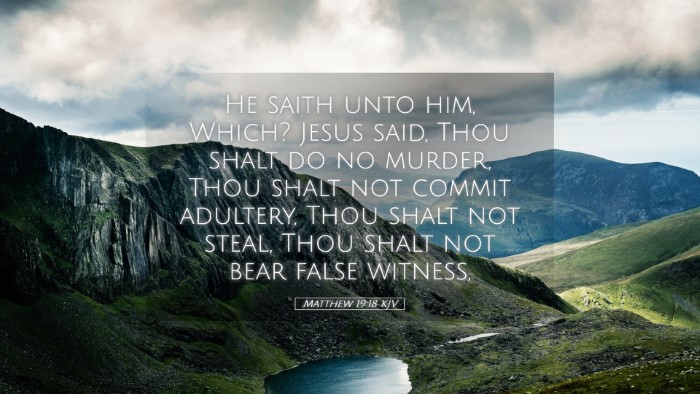Commentary on Matthew 19:18
Verse Reference: Matthew 19:18 - "He said to Him, 'Which ones?' And Jesus said, 'You shall not murder, you shall not commit adultery, you shall not steal, you shall not bear false witness,'"
Introduction
This verse is a part of the dialogue between Jesus and a young wealthy ruler, emphasizing the moral foundation of God's commandments. The inquisition by the ruler and the recounting of the commandments by Christ reveal critical insights into the nature of the law and human responsibility. Insights from several public domain commentaries shed light on various aspects of this passage.
Contextual Background
In understanding Matthew 19:18, it is imperative to consider the broader narrative. The chapter sets the stage for significant teachings on marriage, riches, and eternal life. Commentaries often highlight that Jesus is addressing the young man's perception of righteousness and his understanding of the law.
Insights from Matthew Henry
Matthew Henry points out that when the ruler asks, "Which ones?" he reveals a heart still searching and somewhat insincere in his quest for righteousness. Henry emphasizes the necessity of not only adhering to the commandments but also understanding their deeper spiritual implications.
- Nature of the Law: Henry notes that the commandments listed by Jesus reflect not only outward actions but also heart attitudes. The focus on murder, adultery, and false witness highlights serious breaches of moral integrity.
- Selective Compliance: The man's question indicates a common tendency among believers to approach the law with a checklist mentality, rather than a transformative relationship with God.
Insights from Albert Barnes
Albert Barnes emphasizes the imperative nature of the commandments. He explains how without adherence to these moral laws, one cannot claim genuine obedience to God. The reference to these commandments serves not just as a reminder of behavior but of the heart's condition.
- Rejection of Relativism: Barnes argues that the commandments are not subject to personal interpretation; rather, they stand as absolute truths from God that demand full obedience.
- Spiritual Vanity: He notes that the ruler’s confidence in his observance of these laws could indicate spiritual pride, a theme that runs throughout Jesus’ teachings.
Insights from Adam Clarke
Adam Clarke delves into the implications of this passage for the listener. He points out the unconditional nature of these commandments and how they are intrinsically tied to one's relationship with God. Clarke highlights the importance of recognizing the internal nature of sin as emphasized by Jesus.
- Comprehensive Obedience: Clarke asserts that true obedience encompasses all aspects of life, not merely the outward observance of laws.
- Addressing Heart Issues: He argues that Jesus is not just concerned with physical actions but also the underlying intention behind them. Thus, the call to obey the commandments is also a call to transformational ethics.
Theological Implications
This passage raises profound theological issues regarding the nature of sin, grace, and the Christian life. The summary of commandments serves as both a guide for ethical living and a mirror reflecting the imperfection of humanity.
- Understanding Sin: The act of listing specific commandments serves to highlight the seriousness of sin and the moral law that governs human behavior. It underscores the biblical narrative that humans fall short of the glory of God.
- Need for Grace: The dialogue illustrates the need for God's grace. The young ruler's inability to fully grasp his own spiritual condition speaks to the broader struggle of humanity to meet God's standards.
- Invitation to Relationship: Ultimately, this encounter illustrates that following Christ encompasses more than mere rule adherence; it’s an invitation to a personal relationship that transforms the heart.
Application for Pastors and Theologians
For pastors and theologians, Matthew 19:18 challenges them to instruct their congregations on the nature of true righteousness and the essence of discipleship. It serves as an encouragement to preach a gospel centered on transformation rather than mere moral compliance.
- Developing Discernment: Encourage congregants to pursue a deeper understanding of God’s commands beyond surface-level observance.
- Focus on Heart Change: Teach about the transformational aspect of faith that impacts daily living and relationships.
- Highlighting Grace: Remind believers of the importance of grace and the reality that no one can uphold the law perfectly, necessitating reliance on Christ for justification.
Conclusion
Matthew 19:18 stands as a pivotal moment in revealing the heart of Jesus' teaching on obedience to God's law. It invites serious reflection on the nature of righteousness and God's expectations. The insights garnered from historical commentaries enrich our understanding and encourage a life rooted in Christ's transformative power. For students, theologians, and pastors alike, this passage serves to deepen their study and practice of faith.


